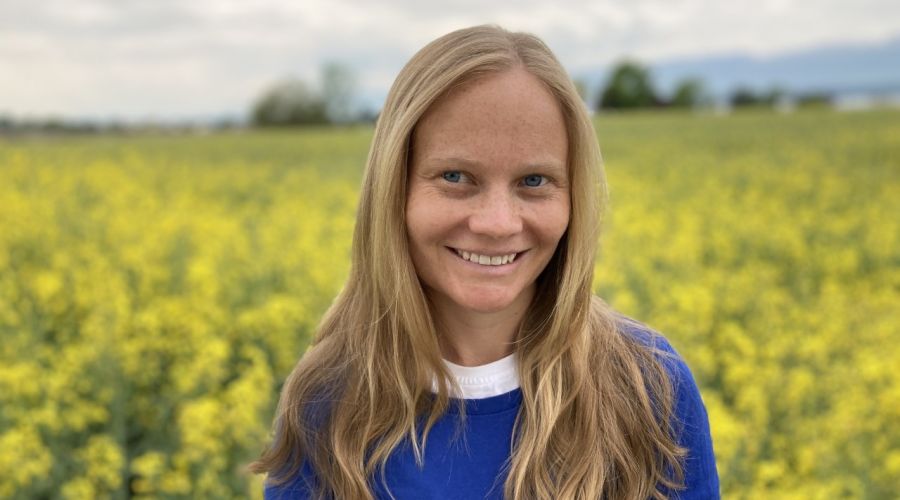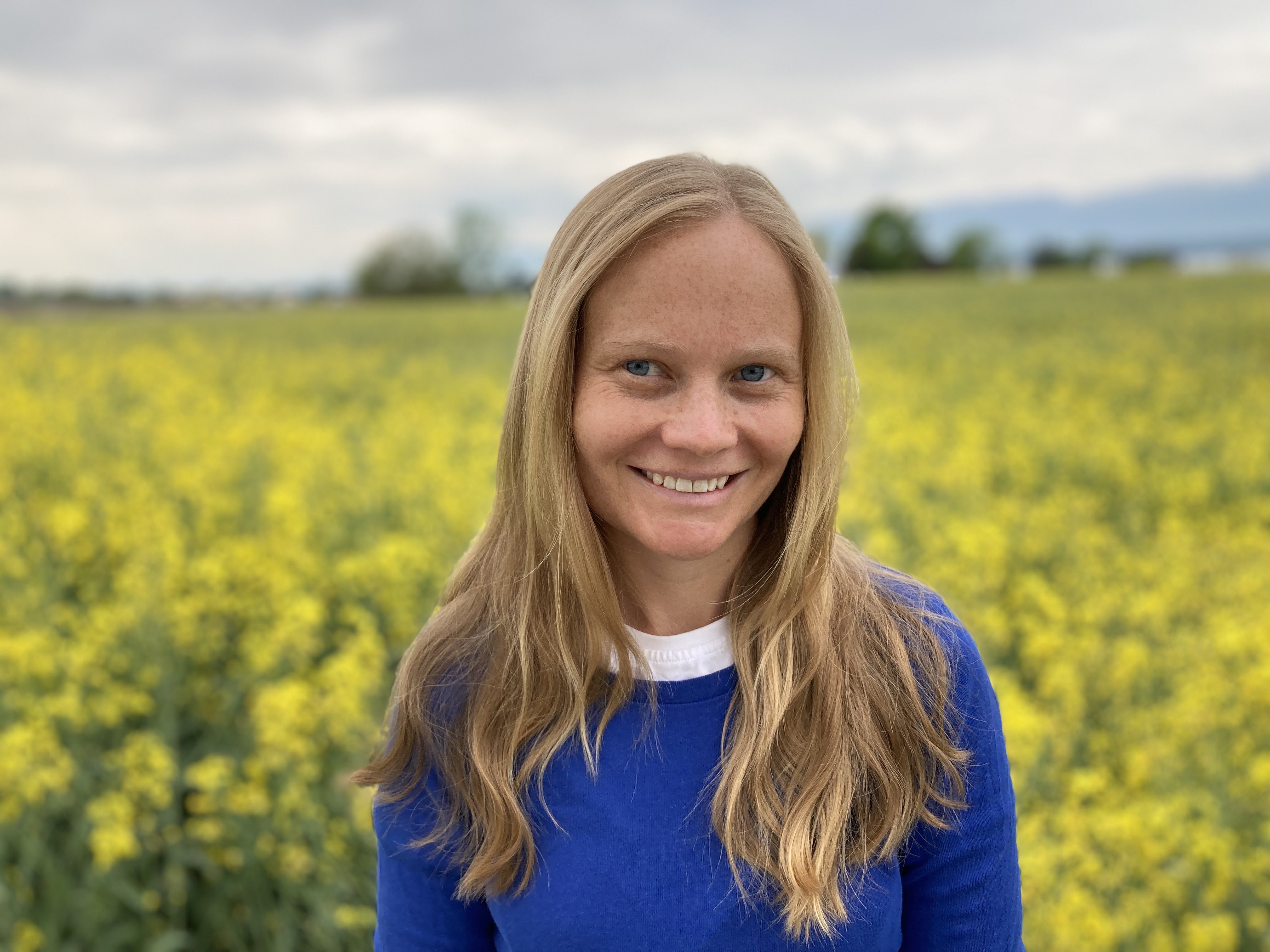
Stella Nordhagen's job at the Global Alliance for Improved Nutrition aims to understand the causes of food insecurity and find solutions.
We need to improve storage and transportation and coordinate better between producers, storage, transport and retail.
Stella Nordhagen
Stella Nordhagen’s current role brings together much of her earlier work in global health and agriculture. Since last April, she has been based in Geneva, working for the Global Alliance for Improved Nutrition (GAIN).
Her job involves bringing together different actors from across the food chain to improve coordination, to understand the causes of food insecurity and develop solutions to ensure more nutritious foods are available and affordable to low-income consumers.
It’s an ambitious programme and she cites concrete examples of the impact it has had.
One area she is working on, for instance, is reducing food waste. Stella [2009] says a third of food produced globally is lost or wasted before it is consumed and that this is a particular issue for low and middle income countries. “Most of the loss or wastage happens before the food reaches the consumer,” she says. “We need to improve storage and transportation and coordinate better between producers, storage, transport and retail.”
In Nigeria, for example, traditional storage of tomatoes and fresh vegetables was in cheap, straw baskets. These get damp and mouldy, and the straw punctures the tomatoes, leading to big losses. GAIN thus helped form an alliance of producers and other value chain actors and worked with them to begin replacing the straw baskets with reusable plastic crates which allow air to circulate better. Initial figures suggest this has reduced losses by up to 20% and some local Nigerian governments are considering making plastic crates mandatory. “It’s a fairly simple, inexpensive solution. If we can get people motivated and show them the benefits we can get them on board,” says Stella.
Another example is in East Africa where there is a lot of innovation going on with regard to providing more nutritious food. SMEs there – who account for most of the private sector food business – want to expand their reach, but need support to access financing. Banks are not set up to loan to SMEs and investors are reluctant to put their money into food production when so much is dependent on changing weather conditions.
GAIN provides small grants and targeted technical assistance to SMEs to help them improve their products. One grant went to a Kenyan company which pre-cooks beans and delivers them to street vendors in Nairobi. Beans are very nutritious, but take a long time to cook and a lot of fuel. The fuel street vendors use is often very dirty and causes health problems for vendors. The company uses Biogas, collected from food waste, to cook the beans sustainably and deliver them to vendors serving low-income labourers, who order it through an app.
“There are a lot of opportunities to achieve multiple social goals through SMEs,” says Stella. “We are trying to take these types of project and create an impact investment fund to focus on channelling investment to them by showing both the financial and social impact they can have.”
The fund is in its design stage and Stella says a similar approach has been taken to green energy, but it has not been used in the nutrition sector before. One of the challenges is measuring impact in the complex world of food production and also assessing how the higher financial risk involved can be buffered to ensure the investment is viable.
From Cambridge to NGO work in Africa
Stella’s interest in food production was what prompted her PhD at Cambridge where she studied farmers’ motivation for choosing to farm diverse crops and how climate change is driving this.
Having finished her PhD she wanted to do something more practical. “I wanted to get my hands dirty and translate my research to the real world,” she says.
So she moved to Burkina Faso and started working with the NGO Helen Keller International which aims to improve agricultural techniques in order to improve nutrition. “In a lot of poor areas across Africa and other regions people tend to eat a single staple carbohydrate such as maize and get a very limited amount of protein and micronutrients which affects their growth, well being and resilience to disease,” says Stella. “The project I was working on aimed to help farmers diversity their crops and animals and improve people’s diets, especially those of young children as well as pregnant and breastfeeding women.”
After two years working at Helen Keller International, Stella took on a broader job based in Dakar, Senegal, which focused on evaluating the impact on nutrition of a diverse range of health, education and agricultural programmes in 12 African countries, with the aim of improving their design in collaboration with policymakers and implementers.
It developed on her previous work but also brought in a global health element which linked back to the work Stella did in global health before Cambridge, first with a research group at Harvard and then at the new Institute for Health Metrics and Evaluations in Seattle, which had just been set up thanks to a Gates Foundation grant.
Stella says her training at Cambridge in doing rigorous literature reviews and using appropriate methodologies for particular settings was good preparation for the new job. “I was able to use the research tools I had acquired at Cambridge and apply them to a different set of questions and apply my findings, based on an understanding of what was useful knowledge for particular stakeholders,” she says. “It was about framing what we had found in the most accessible way so it could be applied on the ground quickly.”
Building networks
Stella stayed in the job for three and a half years, travelling around Africa to visit projects before taking up her current job with GAIN. She says she made the change in part because she wanted to look at the issues she was dealing with from a wider perspective.
GAIN was founded by the UN in 2002 and aims to tackle malnutrition through building alliances across different sectors and with different actors, including policymakers, NGOs and private sector representatives who play such a big role in food preparation and delivery. Stella’s work as an implementation research adviser covers projects in Africa and Asia. The research aims to improve design of policies and programmes. “Most of the projects I worked on before were focused at a farmer level. My work now is much broader. It encompasses agriculture but also the rest of the food value chain – storage, transport, distribution and retail. We look across the system and work to improve different steps along it. We encourage dialogue between different actors, including consumers and companies. We support consumers to become educated to demand safe and nutritious food,” says Stella.
Sustainability is important in agriculture, but it has to be balanced against the needs of poorer countries to provide enough food for their population, says Stella. In the West less than 5% of the population work in agriculture. This compares with up to 80% of the population in countries in Africa and Asia. Any attempts to change the food system, therefore, have to be handled carefully and balanced against other economic needs as well as threats to agriculture from climate change, she states.
Stella adds that there is a double burden of malnutrition in poorer countries – it is not just that people don’t have enough to eat, but many are eating the wrong food, resulting in obesity and associated health problems.
Stella is enjoying the challenges of her new job. “I like working on issues from different angles and having a practical input,” she says. “While I still publish research and go to academic conferences, I like being involved with an organisation that benefits people in the real world.”
She says part of that relates back to her time at Gates Cambridge, networking with people from different disciplines who had an emphasis on impact. “Gates Cambridge people are super interested in a wide range of things and are doing all sorts of amazing work,” she says. “Being part of the Gates Cambridge network has had a lasting benefit.”

Stella Nordhagen
- Alumni
- United States
- 2008 MPhil Environmental Policy
2009 PhD Land Economy - Queens' College












